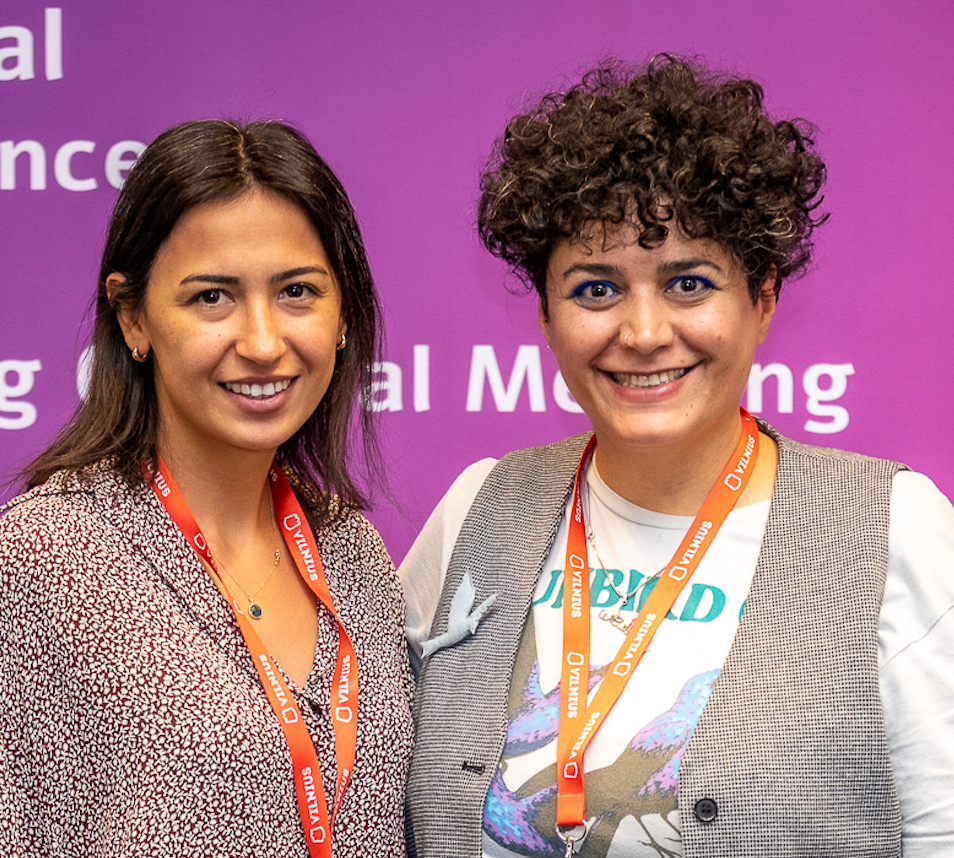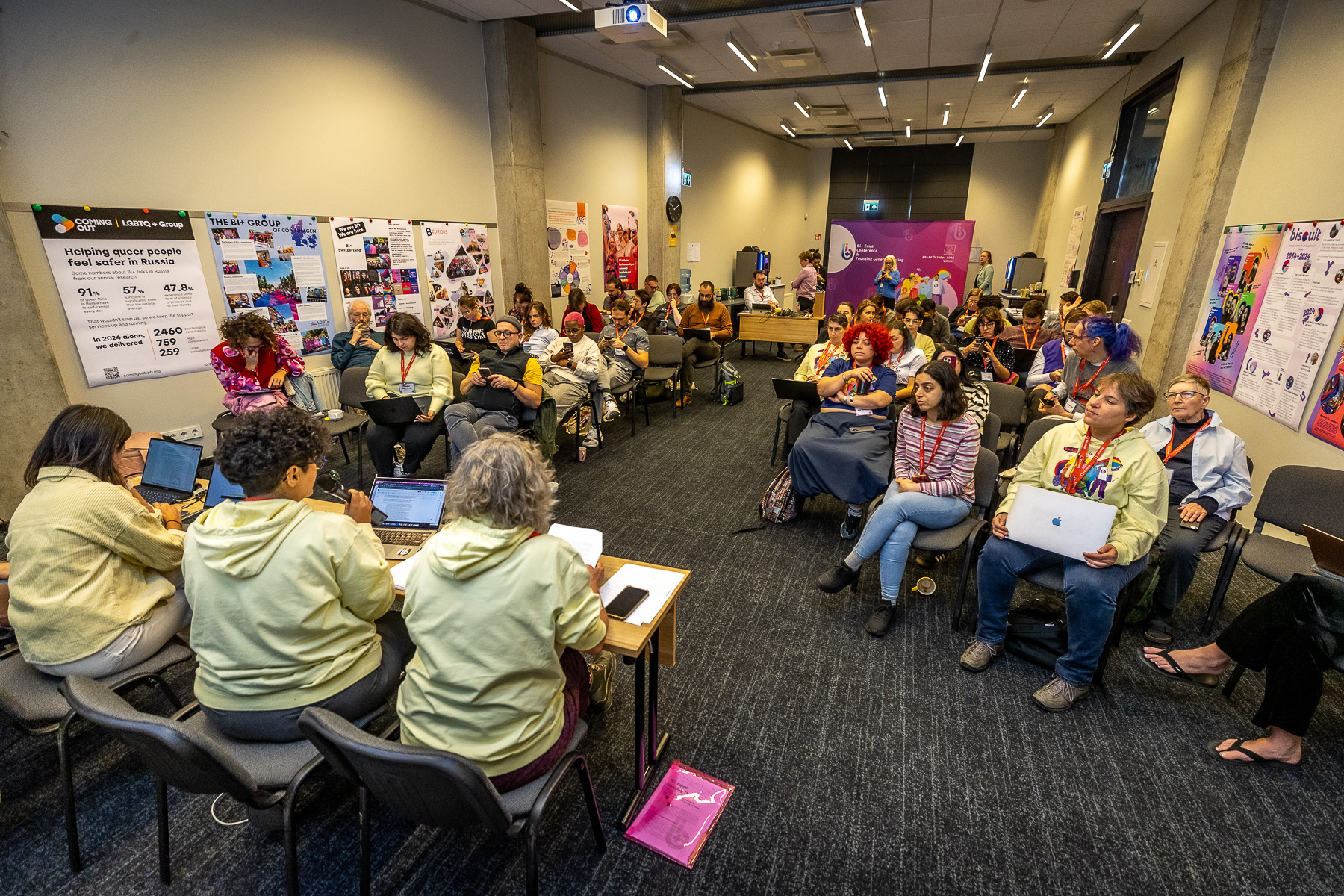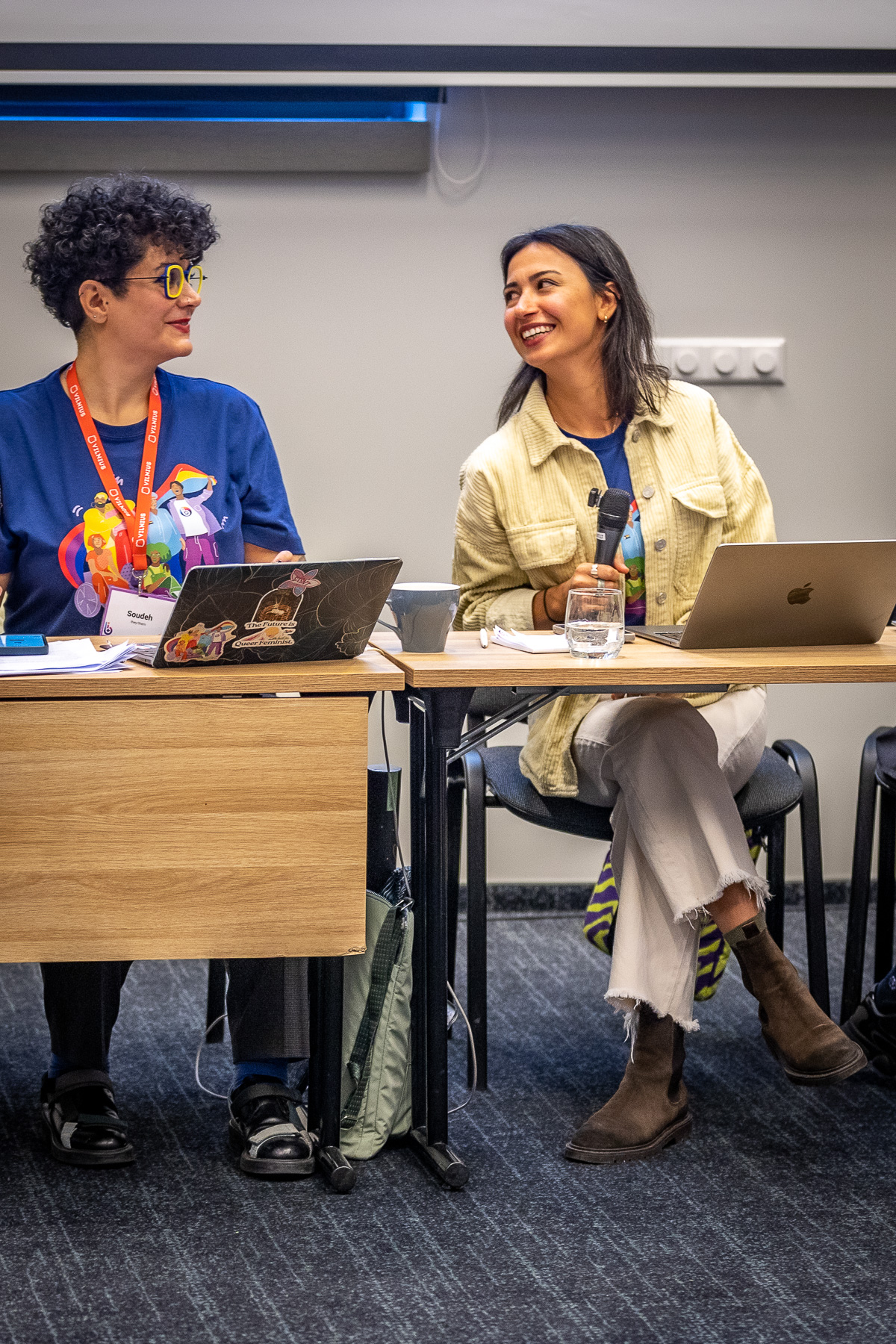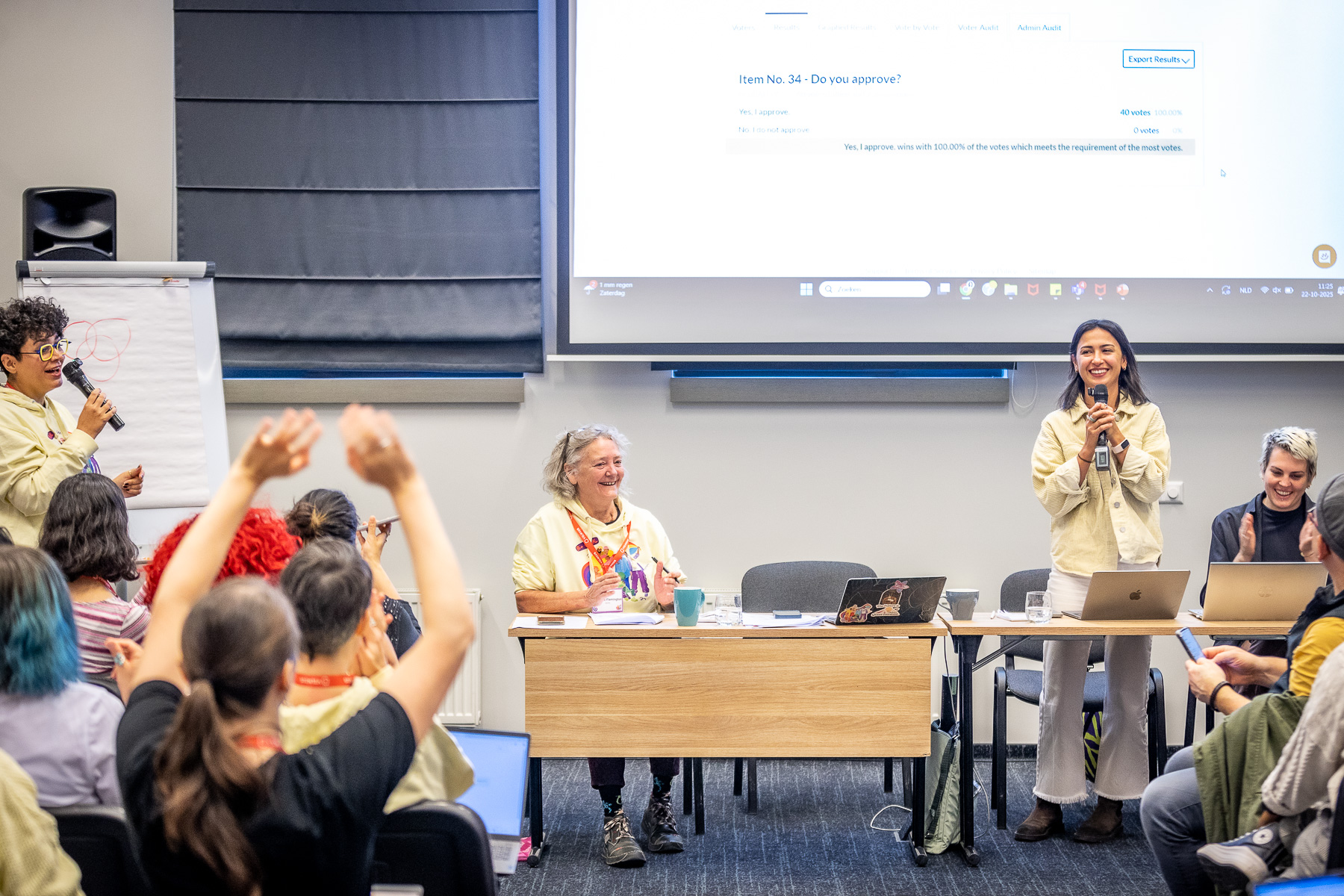November 6, 2025


When we launched the Bi+ Equal project, we knew that our dream wasn’t just to create yet another non-governmental organisation. It was to build a home for bi+ communities across the pan-European region. A home where everyone, regardless of how they identify under the bi+ umbrella, and how they focus on bi+ activism, could be seen, represented, and empowered to shape our shared future.
But as anyone who has ever tried to turn a shared vision into a functioning organisation knows, dreams need structure to come true. So, that’s where governance comes in and made a big part of the Bi+ Equal project…
At first glance, governance might sound like an overwhelming term that immediately reminds us of constitutions, decision-making rules, and voting procedures. And yes, it can be that.
For us, at Bi+ Equal and many other NGOs, governance is much more than a set of policies. It’s about how we make decisions together, how we share power fairly, and how we make sure every voice can be heard. Our governance shapes a democracy where the voices of the unheard are heard and their rights are guaranteed. In other words, it’s how we bring our values of equity, transparency, and intersectionality to life, while learning from the experiences and history of the LGBTQIA+ movement, the racialised and displaced people movements, indigenous people, and more. Knowing we won’t be able to be perfect at all times, Bi+ Equal aimed for a strong foundation. We want to plant a seed to be nourished by our common values and dreams to become a structure, a tree nourishing us, and beyond the bi+ community back.
Here is a memoir of this journey, so far.

As a young association-to-be, Bi+ Equal needed a solid foundation that could support our needed advocacy work, our community-building, and our long-term sustainability. These were the main needs of the community as assessed in the Bi+ Equal Survey.
We know that transparent and participatory governance helps organisations grow with integrity. This is even more important if not vital for any member-based organisation. It creates clarity on who decides what, how members participate, what the responsibilities are, and how we hold ourselves accountable to our communities.
For us, this wasn’t just a checklist exercise; it was about living our values through our structures. And this was taken into account throughout the whole journey, from designing the process to the moment the proposed articles were put to a vote in the Founding General Meeting. When we talk about equality, we often think about rights and visibility, but equality also lives in how we make decisions, share power, and build structures that last. A governance structure created and practiced by indigenous communities, and many other structures that consider themselves outside the imposed practice of colonialist culture.
From the start, we wanted Bi+ Equal’s governance to reflect the diversity of bi+ experiences and needs. Coming from intersectional feminism practice, we were and are aware of the diversity of the bi+ community, how they live under intersecting oppressions — different gender identities, (a)sexualities, racial and ethnic backgrounds, (dis)abilities, and lived experiences, and more. That meant our governance couldn’t just look democratic on paper; it needed to be “intersectional feminist” by design.

To be able to walk a journey, we needed to have a clear set of milestones. The path to get to the Founding General Meeting had to be as solid, transparent, and participatory as we wanted the umbrella organisation to be. Soudeh, our Vice-Director and Governance Lead, put their learnings and experiences into designing the process. But this was obviously not a one-person job. Soudeh needed a trustworthy and passionate partner to join the Bi+ Equal Governance team.
Among the younger generation of governance geeks, Demet stood out with her experience, knowledge, and passion. Demet joined the small team of governance as the Governance Analyst in the first days of 2025. They held weekly meetings all along January through October. They stayed in a brave and safe space, which enabled them to discuss hard topics, think, laugh, and dive into details both in substance and form. This definitely explains part of their tearful eyes and firm hugs on October 22nd.
The following steps of our journey began with a simple question: “How do fellow pan-European LGBTQIA+ organisations do it?”, the answer to which would then be followed by “What does good governance of Bi+ Equal look like for us?”
Thus, we started by studying how other membership-based LGBTQIA+ organisations structured themselves. We compared constitutions, membership models, decision-making processes, and voting procedures. We drew inspiration from what worked while being honest about what might not fit the bi+ context and what could be just for an organisation created in 2025.
This comparative research gave us a clearer picture of the landscape. Some organisations had very formal, legally tight structures; others worked more informally, relying on community trust and flexibility. We saw value in both and realised that Bi+ Equal needed a model that balances structure with fluidity, just like the community it represents.
This comparative study published early July 2025, unique and never done before, was not only done to serve the Bi+ Equal objectives. It draws a clear picture of the four pan-European organisations in 2025. The analysis is not only desk research, as it also involved conversations and interviews with the representatives of the Board and Executive directors of EL*C, IGLYO, ILGA-Europe and TGEU.
From there, and of course, taking into account “the Bi+ Equal dream”, we began drafting our own Constitution — a process that was anything but linear. It involved many discussions, consultations, and rounds of feedback. We wanted every clause to be intentional: every decision-making body, every election process, every member's rights carefully thought through.
Our guiding question throughout was: “Does this empower our entire community? Does it unintentionally exclude someone?”
That question helped us shape principles around representation, accessibility, and equity.
As the next step, we created the Bi+ Equal Governance Pool of Consultants as our sounding board. Those who said yes to our call, Ruth Baldacchino, Yassine Chagh, Anwar Ogrm, and Darienne Flemington, joined us in this journey with all their passion, experiences, and expertise in governance of LGBTQIA+ (and other) organisations. These conversations adjusted our proposals even more before we brought them into the community. They stepped in and often played the devil's advocate, while acknowledging that we were onto something — something huge and inspiring.
In early August 2025, we published our first draft of the proposed articles for the Constitution and shared it with the community. We held two online workshops solely about these proposals in August and September 2025. The feedback from the community helped us to adjust the proposals even more and make this journey a truly participatory process.
From August to October, the Governance Team elaborated and developed the remaining necessary parts of the structure (articles of the Constitution), and the motions to be discussed and voted on during the Founding General Meeting.
During the hybrid General Meeting in Vilnius, we held 2 hybrid workshops of 90 minutes, and another 120-minute workshop going through every single article. Again, this shaped the final versions of what was put to a vote and the recommendations of the workshop.
On October 22nd, at 12:30 Vilnius local time, we celebrated the approval of the Constitutional articles and the four motions. A moment of joy that nobody will forget.
To belong to a community that dares to dream together — to debate, vote, and approve solid and inclusive foundations — is a privilege. It renews our belief in collective power, at a time when genocides unfold before our eyes, wars are fuelled by patriarchy and colonialism, and democracy and marginalized voices face constant peril.

Building governance from scratch has been both humbling and energising. It’s easy to get caught up in the technicalities: the by-laws, the definitions, the procedures… However, the heart of governance lies in relationships.
We learned that creating truly inclusive governance means slowing down. It means taking the time to explain, to consult, and to invite participation even when it means extra (really extra) workload.
We received written feedback over emails (harshly penned at times). Then, we found ourselves immersed in thought-provoking discussions. It turns out that our community can literally spend hours on the wording of “Purpose” in our Constitution... And hours of one-to-one or small group (sometimes heated) discussions about the definition of “bi+” and election methods. We have not only general governance geeks in the community but also some who come with their applied mathematics and experience in voting systems, and have keen eyes on research in the field. These moments, even though hard and sometimes technical, in the conference room or over breakfast, lunch or dinner, were still filled with laughter, quick visual presentation designs for the proposals and even explanatory videos, so everyone could make an informed choice. In-person sessions at the Bi+ Equal Conference and Founding General Meeting in Vilnius — a city that brought out the governance geeks in all of us in a way that the governance workshops were the most attended sessions — who would've thought?!
At the end of the day, we collectively learned to embrace imperfection. No governance model is perfect — it evolves with the community it serves. What set our minds at ease most was that the foundation was participatory and that people feel ownership of it. What lay behind every single feedback and praise was care: the bi+ community’s collective care.

As our framework took shape, several features began to stand out:
In other words, our governance model is more than a rulebook. It’s a reflection of who we are and what we stand for. We proudly belong to this community and are humbled to have been able to foster this milestone in the pan-European (and maybe global) bi+ community.

We’re now at an exciting point in this journey. With our Constitutional articles approved by an impressive majority, we’ll be taking the legal steps to register Bi+ Equal in the Netherlands.
Governance is never finished. For us, it’s not just a set of rules on paper but a living practice that grows alongside our movement. We hope that, years from now, we’ll look back on these first steps with pride.
For us at Bi+ Equal, governance is more than an internal task. It’s a political act. It’s about reclaiming how power is shared, how voices are valued, and how communities can organise themselves with and around collective decolonised care.
Every policy we write, every decision-making structure we design, is a small step toward building the kind of world we want to live in.
We’re proud to call ourselves governance geeks — because if there’s one thing we’ve learned, it’s that good governance isn’t boring and our community has a lot of governance geeks who would do anything to take Bi+ Equal, the pan-European bi+ umbrella organisation, to a better place.
And we’re just getting started.
